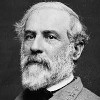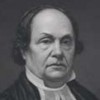So whatever you want to do, just do it. Don’t worry about making a damn fool of yourself. Making a damn fool of yourself is absolutely essential. And you will have a great time.
Gloria Steinem (b. 1934) American feminist, journalist, activist
Commencement address, Tufts University (1987-05-17)
(Source)
Quotations about:
boldness
Note not all quotations have been tagged, so Search may find additional quotes on this topic.
A vast deal may be done by those who dare to act.
It now only remains for me to say in conclusion: Be a fearless cook! Try out new ideas and new recipes, but always buy the freshest and finest of ingredients, whatever they may be. Furnish your kitchen with the most solid and workmanlike equipment you can find. Keep your knives ever sharp and — toujours bon appetit!
Julia Child (1912-2004) American chef and writer
Julia Child’s Kitchen, Introduction (1975)
(Source)
Yield not to evils, but the bolder thou
Persist, defiant of misfortune’s frown,
And take the path thy Destinies allow.[Tu ne cede malis, sed contra audentior ito
Quam tua te fortuna sinet.]Virgil (70-19 BC) Roman poet [b. Publius Vergilius Maro; also Vergil]
The Aeneid [Ænē̆is], Book 6, l. 95ff (6.95-96) [The Sybil] (29-19 BC) [tr. Taylor (1907), st. 15, ll. 12]
(Source)
Stoic maxim. There is argument as to whether it should be quam or qua, leading to some variations in translating the second half of the quotation.
(Source (Latin)). Alternate translations:
Yet dangers fear not, but on bolder goe,
What course thy fortune grants
[tr. Ogilby (1649)]
But thou, secure of soul, unbent with woes,
The more thy fortune frowns, the more oppose.
[tr. Dryden (1697)]
Yield not under your sufferings, but encounter them with greater boldness than your fortune shall permit.
[tr. Davidson/Buckley (1854)]
Yet still despond not, but proceed
Along the path where Fate may lead.
[tr. Conington (1866)]
Yet yield not thou, but go more boldly on,
Where Fortune leads, till victory be won.
[tr. Cranch (1872), ll. 121-122]
Yield not thou to distresses, but all the bolder go forth to meet them, as thy fortune shall allow thee way.
[tr. Mackail (1885)]
But thou, yield not to any ill, but set thy face, and wend
The bolder where thy fortune leads.
[tr. Morris (1900)]
Oh! yield not to thy woe, but front it ever,
And follow boldly whither Fortune calls.
[tr. Williams (1910)]
Yield not thou to ills, but go forth to face them more boldly than thy Fortune shall allow thee!
[tr. Fairclough (1916)]
Do not yield to evil,
Attack, attack, more boldly even than fortune
Seems to permit.
[tr. Humphries (1951)]
But never give way to those evils: face them all the more boldly,
Using what methods your luck allows you.
[tr. Day-Lewis (1952)]
Do not relent before distress, but be
far bolder than your fortune would permit.
[tr. Mandelbaum (1971), ll. 132-33]
Never shrink from blows.
Boldly, more boldly where your luck allows,
Go forward, face them.
[tr. Fitzgerald (1981), ll. 143-45]
You must not give way to these adversities but must face them all the more boldly wherever your fortune allows it.
[tr. West (1990)]
Do not give way to misfortunes, meet them more bravely,
as your destiny allows.
[tr. Kline (2002)]
Do not yield, but oppose your troubles
All the more boldly, as far as your fate
And fortune allow.
[tr. Lombardo (2005)]
But never bow to suffering, go and face it,
all the bolder, wherever Fortune clears the way.
[tr. Fagles (2006), ll. 113-14]
Don’t yield to evils, but go boldly forward
Where your fortune bids you.
[tr. @sentantiq (2018)]
Don't give up at these misfortunes. Be as brave as Fortune lets you.
[tr. Bartsch (2021)]
You go on inside. Be bold, nothing to fear.
In every venture the bold man comes off best,
even the wanderer, bound from distant shores.[σὺ δ᾽ ἔσω κίε, μηδέ τι θυμῷ
τάρβει: θαρσαλέος γὰρ ἀνὴρ ἐν πᾶσιν ἀμείνων
ἔργοισιν τελέθει, εἰ καί ποθεν ἄλλοθεν ἔλθοι.]Homer (fl. 7th-8th C. BC) Greek author
The Odyssey [Ὀδύσσεια], Book 7, l. 50ff (7.50) (c. 700 BC) [tr. Fagles (1996)]
(Source)
(Source (Greek)). Alternate translations:
Enter amongst them, nor admit a fear.
More bold a man is, he prevails the more,
Though man nor place he ever saw before.
[tr. Chapman (1616)]
Though you a stranger be, fear not, go in;
The bold than fearful always better speed.
[tr. Hobbes (1675), ll. 45-46]
Fear not, but be bold:
A decent boldness ever meets with friends,
Succeeds, and even a stranger recommends.
[tr. Pope (1725)]
But enter fearing nought, for boldest men
Speed ever best, come whencesoe’er they may.
[tr. Cowper (1792), ll. 60-61]
Now enter, and all fear forego,
Since it is always on the bold in mind,
Strange though his stock, that fortune shines most kind.
[tr. Worsley (1861), st. 8]
Go in! with no faint heart: --
The bold man ever wins the best success
In all his works, e'en tho' from far he come!
[tr. Bigge-Wither (1869)]
Enter then, and fear not in thine heart, for the dauntless man is the best in every adventure, even though he come from a strange land.
[tr. Butcher/Lang (1879)]
Go in and have no dread:
For the man that is stout and hardy drives all things better home,
Whatever of deeds be toward; yea, e'en if from far he come.
[tr. Morris (1887)]
But enter, and have no misgivings in your heart; for the courageous man in all affairs better attains his head, come he from where he may.
[tr. Palmer (1891)]
But do not be afraid; go straight in, for the bolder a man is the more likely he is to carry his point, even though he is a stranger.
[tr. Butler (1898)]
Go thou within, and let thy heart fear nothing; for a bold man is better in all things, though he be a stranger from another land.
[tr. Murray (1919)]
Thrust in fearlessly: however foreign a man may be, in every crisis it is the high face which will carry him through.
[tr. Lawrence (1932)]
Go straight in and have no qualms. For it is the bold man who every time does best, at home or abroad.
[tr. Rieu (1946)]
You must not be dismayed; go in to them. A cheerful man does best in every enterprise -- even a stranger.
[tr. Fitzgerald (1961)]
When you go in, forget your fear: far better
to be a bold man, though a stranger here.
[tr. Mandelbaum (1990)]
Go inside and don't be afraid of anything.
Things turn out better for a man who is bold,
Especially if he's a stranger from a distant land.
[tr. Lombardo (2000)]
Go in and have no fear in your heart; in every kind of action the dauntless man always proves the better, even if he hails from some distant country.
[tr. Verity (2016)]
Do not be scared; go in. The brave succeed in all adventures, even those who come from countries far away.
[tr. Wilson (2017)]
Combining rational intelligence with all the imagination we can command, let us project ourselves forcefully into the future. In doing so, let us not fear occasional error — the imagination is only free when fear of error is temporarily laid aside. Moreover, in thinking about the future, it is better to err on the side of daring, than the side of caution.
Of all forms of caution, caution in love is perhaps the most fatal to true happiness.
Bertrand Russell (1872-1970) English mathematician and philosopher
The Conquest of Happiness, ch. 12 (1930)
(Source)
To write in plain, vigorous language one has to think fearlessly, and if one thinks fearlessly one cannot be politically orthodox.
George Orwell (1903-1950) English writer [pseud. of Eric Arthur Blair]
“The Prevention of Literature,” Polemic (Jan 1946)
(Source)
The first symptom of true love in a young man is timidity; in a young girl it is boldness. This is surprising, and yet nothing is more simple. It is the two sexes tending to approach each other and assuming each the other’s qualities.
Victor Hugo (1802-1885) French writer
Les Misérables, Vol. 4, Book 3, ch. 6 (1862) [tr. Hapgood]
(Source)
Let me tell you the secret of such so-called successes as there have been in my life, and here I believe I give you really good advice. It was to burn my boats and demolish my bridges behind me. Then one loses no time in looking behind, when one should have quite enough to do in looking ahead — then there is no chance for you or your men but forward. You have to do or die!
Fridtjof Nansen (1861-1930) Norwegian explorer, scientist, diplomat, humanitarian
Speech, St Andrews University (3 Nov 1926)
(Source)
Translated in his Adventure, and Other Papers (1927).
You know, that might be the answer — to act boastfully about something we ought to be ashamed of. That’s a trick that never seems to fail.
And as she looked about, she did behold
How over that same door was likewise writ,
Be bold, be bold, and everywhere Be bold,
That much she mused, yet could not construe it
By any riddling skill or common wit.
At last she spied at that room’s upper end
Another iron door, on which was writ,
Be not too bold.Edmund Spenser (c. 1552-1599) English poet
The Faerie Queen, Book 3, Canto 11, st. 54 (1590-96)
(Source)
Get action. Seize the moment. Man was never intended to become an oyster.
Theodore Roosevelt (1858-1919) American politician, statesman, conservationist, writer, US President (1901-1909)
Comment to Mrs. J. A. Roosevelt (25 Dec 1851)
(Source)
Quoted in David McCullough, Mornings on Horseback (1981), sourced from the W. Sheffield Cowles, Jr. Collection (private). Usually given as a quote in full to his children, McCullough only notes the last sentence ("Man ... oyster") as an actual quotation.
There are many fine things which you mean to do some day, under what you think will be more favorable circumstances. But the only time that is surely yours is the present, hence this is the time to speak the word of appreciation and sympathy, to do the generous deed, to forgive the fault of a thoughtless friend, to sacrifice self a little more for others. Today is the day in which to express your noblest qualities of mind and heart, to do at least one worthy thing which you have long postponed, and to use your God-given abilities for the enrichment of some less fortunate fellow traveler. Today you can make your life big, broad, significant and worthwhile. The present is yours to do with it as you will.
She was already learning that if you ignore the rules people will, half the time, quietly rewrite them so that they don’t apply to you.
Terry Pratchett (1948-2015) English author
Equal Rites (1987)
(Source)
Of the character Eskarina "Esk" Smith, modeled after Pratchett's daughter, Rhianna.
The cruelties and the obstacles of this swiftly changing planet will not yield to obsolete dogmas and outworn slogans. It cannot be moved by those who cling to a present which is already dying, who prefer the illusion of security to the excitement and danger which comes with even the most peaceful progress. This world demands the qualities of youth: not a time of life but a state of mind, a temper of the will, a quality of the imagination, a predominance of courage over timidity, of the appetite for adventure over the love of ease.
Robert Francis Kennedy (1925-1968) American politician
“Day of Affirmation,” address, University of Capetown, South Africa (6 Jun 1966)
(Source)
The main rule of writing is that if you do it with enough assurance and confidence, you’re allowed to do whatever you like. (That may be a rule for life as well as for writing. But it’s definitely true for writing.) So write your story as it needs to be written. Write it honestly, and tell it as best you can. I’m not sure that there are any other rules. Not ones that matter.
Neil Gaiman (b. 1960) British author, screenwriter, fabulist
In “Ten Rules for Writing Fiction,” The Guardian (20 Feb 2010)
(Source)
Sail forth! steer for the deep waters only!
Reckless, O soul, exploring, I with thee, and thou with me;
For we are bound where mariner has not yet dared to go,
And we will risk the ship, ourselves and all.
Be true to your own act, and congratulate yourself if you have done something strange and extravagant, and broken the monotony of a decorous age. It was a high counsel that I once heard given to a young person, “Always do what you are afraid to do.”
Ralph Waldo Emerson (1803-1882) American essayist, lecturer, poet
“Heroism,” Essays: First Series (1841)
See also Schmich.
Fortune favors the bold.
[Audentis Fortuna iuvat]
Virgil (70-19 BC) Roman poet [b. Publius Vergilius Maro; also Vergil]
The Aeneid [Ænē̆is], Book 10, l. 284 (10.284) [Turnus] (29-19 BC) [tr. West (1990)]
(Source)
The Rutulian prince exhorting his men to meet Aeneas' Trojans on the beach as they land. Not a sentiment invented by Virgil. See also Terence.
(Source (Latin)). Alternate translations:
Fortune assists the bold.
[tr. Ogilby (1649)]
Fortune befriends the bold.
[tr. Dryden (1697)]
Fortune assists the daring.
[tr. Davidson/Buckley (1854)]
Fair fortune aids the bold.
[tr. Conington (1866)]
Fortune assists the bold.
[tr. Cranch (1872), l. 380]
Fortune aids daring.
[tr. Mackail (1885)]
For Fortune helpeth them that dare.
[tr. Morris (1900)]
Fair Fortune aids the bold.
[tr. Taylor (1907), st. 37, l. 342]
Fortune will help the brave.
[tr. Williams (1910)]
Fortune aids the daring.
[tr. Fairclough (1918)]
And luck helps men who dare.
[tr. Humphries (1951)]
Fortune always fights for the bold.
[tr. Day-Lewis (1952)]
For fortune
helps those who dare.
[tr. Mandelbaum (1971), ll. 395-96]
Fortune
favors men who dare!
[tr. Fitzgerald (1981), ll. 392-93]
Fortune favours the brave.
[tr. Kline (2002)]
Fortune speeds the bold!
[tr. Fagles (2006), l. 341]
Respectfulness, without the rules of propriety, becomes laborious bustle; carefulness, without the rules of propriety, becomes timidity; boldness, without the rules of propriety, becomes insubordination; straightforwardness, without the rules of propriety, becomes rudeness.
[恭而無禮則勞、愼而無禮則葸、勇而無禮則亂、直而無禮則絞。]
Confucius (c. 551- c. 479 BC) Chinese philosopher, sage, politician [孔夫子 (Kǒng Fūzǐ, K'ung Fu-tzu, K'ung Fu Tse), 孔子 (Kǒngzǐ, Chungni), 孔丘 (Kǒng Qiū, K'ung Ch'iu)]
The Analects [論語, 论语, Lúnyǔ], Book 8, verse 2 (8.2.1) (6th C. BC – AD 3rd C.) [tr. Legge (1861)]
(Source)
(Source (Chinese)). Brooks (below) believes this text was interpolated into Book 8 at the time that Book 14 was collected. Alternate translations:
Without the Proprieties, we have these results: for deferential demeanour, a worried one; for calm attentiveness, awkward bashfulness; for manly conduct, disorderliness; for straightforwardness, perversity.
[tr. Jennings (1895)]
Earnestness without judgment becomes pedantry; caution without judgment becomes timidity; courage without judgment leads to crime; uprightness without judgment makes men tyrannical.
[tr. Ku Hung-Ming (1898)]
Courtesy uncontrolled by the laws of good taste becomes labored effort, caution uncontrolled becomes timidity, boldness uncontrolled becomes recklessness, and frankness uncontrolled become effrontery.
[tr. Soothill (1910)]
Respect without rules of procedure becomes laborious fuss: scrupulosity without rules of procedure, timidity (fear to show the thought); boldness without such rules breeds confusion; directness without rules of procedure becomes rude.
[tr. Pound (1933)]
Courtesy not bounded by the prescriptions of ritual becomes tiresome. Caution not bounded by the prescriptions of ritual becomes timidity, daring becomes turbulence, inflexibility becomes harshness.
[tr. Waley (1938)]
Not to follow the rites in being modest is annoyance. Not to follow them in exercising care is timidity. Not to follow them in acts of bravery is confusion. Not to follow them in our uprightness is brusqueness.
[tr. Ware (1950)]
Unless a man has the spirit of the rites, in being respectful he will wear himself out, in being careful he will become timid, in having courage he will become unruly, and in being forthright he will become intolerant.
[tr. Lau (1979)]
If one is courteous but does without ritual, then one dissipates one's energies; if one is cautious but does without ritual, then one becomes timid; if one is bold but does without ritual, then one becomes reckless; if one is forthright but does without ritual, then one becomes rude.
[tr. Dawson (1993)]
Without ritual, courtesy is tiresome; without ritual, prudence is timid; without ritual, bravery is quarrelsome; without ritual, frankness is hurtful.
[tr. Leys (1997)]
Respectfulness without the rituals becomes laboriousness; discretion without the rituals becomes apprehensiveness; courage without the rituals becomes rebelliousness; straightforwardness without the rituals becomes impetuosity.
[tr. Huang (1997)]
One would be tired if one is humble but not polite; One would be week if one is cautious but not polite; One would be foolhardy if one is brave but not polite; One would be caustic if one is frank but not polite.
[tr. Cai/Yu (1998), #190]
Deference unmediated by observing ritual propriety [li] is lethargy; caution unmediated by observing ritual propriety is timidity; boldness unmediated by observing ritual propriety is rowdiness; candor unmediated by observing ritual propriety is rudeness.
[tr. Ames/Rosemont (1998)]
If he is respectful without propriety, he becomes wearisome. If he is careful without propriety, he becomes finicky. If he is brave without propriety, he becomes disruptive. If he is upright without propriety, he becomes censorious.
[tr. Brooks/Brooks (1998)]
Reverence becomes tedium without Ritual, and caution becomes timidity. Without Ritual, courage becomes recklessness, and truth becomes intolerance.
[tr. Hinton (1998)]
If you are respectful but lack ritual you will become exasperating; if you are careful but lack ritual you will become timid; if you are courageous but lack ritual you will become unruly; and if you are upright but lack ritual you will become inflexible.
[tr. Slingerland (2003)]
Courtesy without ritual becomes labored; caution without ritual becomes timidity; daring without ritual becomes riotousness; directness without ritual becomes obtrusiveness.
[tr. Watson (2007)]
Unless a man acts according to the spirit of the rites, in being respectful, he will tire himself out; in being cautious, he will become timid; in being brave, he will become unruly; in being forthright, he will become derisive.
[tr. Chin (2014)]
BRUTUS: There is a tide in the affairs of men
Which, taken at the flood, leads on to fortune;
Omitted, all the voyage of their life
Is bound in shallows and in miseries.
On such a full sea are we now afloat,
And we must take the current when it serves
Or lose our ventures.William Shakespeare (1564-1616) English dramatist and poet
Julius Caesar, Act 4, sc. 3, l. 249ff (4.3.249-255) (1599)
(Source)
Twenty years from now you will be more disappointed by the things that you didn’t do than by the ones you did do. So throw off the bowlines. Sail away from the safe harbor. Catch the trade winds in your sails. Explore. Dream. Discover.
Mark Twain (1835-1910) American writer [pseud. of Samuel Clemens]
(Spurious)
A common "inspirational" quote, frequently attributed to Twain, but not found in writings. Earliest found is in H. Jackson Brown, P.S. I Love You (1990), attributed to Brown's mother. More info here.
When a resolute young fellow steps up to the great bully, the world, and takes him boldly by the beard, he is often surprised to find it comes off in his hand, and that it was only tied on to scare away the timid adventurers.
Oliver Wendell Holmes, Sr. (1809-1894) American poet, essayist, scholar
Elsie Venner, ch. 2 (1891)
(Source)
Often misattributed to Ralph Waldo Emerson.
There is no greater mistake than to try to leap an abyss in two jumps.
David Lloyd George (1863-1945) Welsh politician, statesman, UK Prime Minister (1916-22)
War Memoirs of David Lloyd George, Vol. 2, ch. 24 (1933)
Not original with Lloyd George, but usually attributed to him. For more information, see here. Variants:
- "Don’t be afraid to take a big step. You can’t cross a chasm in two small jumps."
- "The most dangerous thing in the world is to leap a chasm in two jumps."
- "Anything can be achieved in small, deliberate steps. But there are times you need the courage to take a great leap; you can't cross a chasm in two small jumps."
- "There is nothing more dangerous than to leap a chasm in two jumps."
Security is mostly a superstition. It does not exist in nature, nor do the children of men as a whole experience it. God Himself is not secure, having given man dominion over His works! Avoiding danger is no safer in the long run than outright exposure. The fearful are caught as often as the bold. Faith alone defends. Life is either a daring adventure or nothing. To keep our faces toward change and behave like free spirits in the presence of fate is strength undefeatable.
Helen Keller (1880-1968) American author and lecturer
Let Us Have Faith, “Faith Fears Not” (1940)
(Source)
Reprinted in her compilation book, The Open Door (1957). This quotation is often given in excerpted form, leaving out certain sentences, or even rearranging some of the sentences and sometimes making it seem that the two sources are actually different.










































